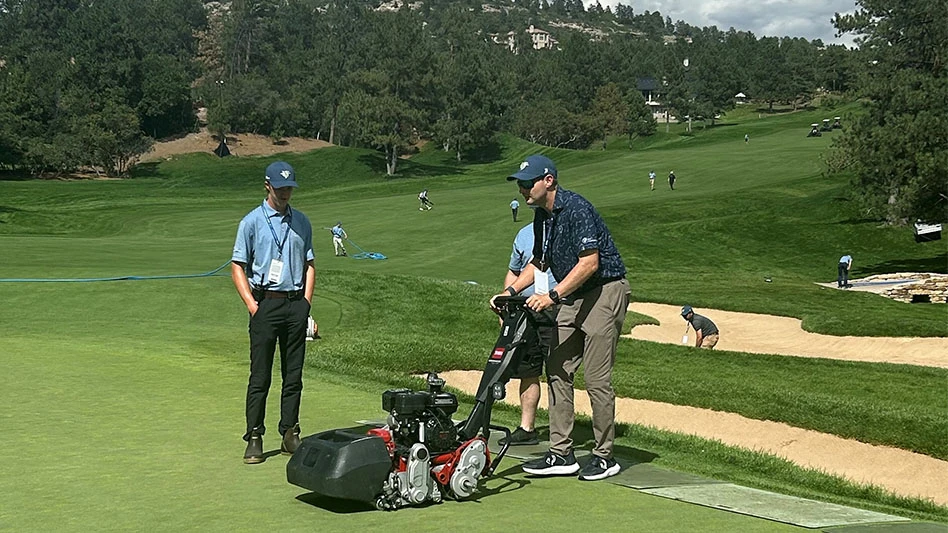
Tyler Bloom (2)
Last week, I found myself at Castle Pines Golf Club, immersed in the buzz of the BMW Championship. My primary purpose was to catch up with a longtime friend and former co-worker Scott Pavalko and support his team.
But as the morning maintenance shift wrapped up on Friday, a young turf professional asked me a question that really made me think: "What’s the value of volunteering at a PGA event for one's career?"
At 37, with the benefit of hindsight, I can confidently say that my career as a golf course superintendent—and now my company—has reaped significant rewards from such experiences. Over the past 20 years, the relationships I’ve built while volunteering at professional tournaments have not only enriched my professional journey, but have also elevated my company’s standing in ways I couldn’t have imagined.
From good to great
Whether you're a volunteer or a staff member, the experience offers exposure to high-level operations, fromlogistical planning to teamwork under the pressure of a world-class event.
A number of volunteers I met had never been exposed to a professional level tournament, let alone worked outside their geographic region, including multiple individuals from Europe. Getting out of one’s comfort zone in a hands-on environment can enhance social skills, communication and build confidence in a manner that no chapter association event or classroom setting can.

Benchmarking your skills, knowledge and performance against the high standards required by the PGA Tour may cripple some, but my observation is the rising tide of volunteers lifts all. I’m certain many volunteers who wielded backpack blowers up and down the 662-yard first hole won’t soon forget how meticulous the PGA Tour officials were about the fairways’ cleanliness after the morning cut. That attention to detail, while perhaps not always sustainable, is a lesson in the standards required at the highest level of the sport.
Castle Pines, like many tour stops, is a template for technology and data-centric practices. Whether it is in-ground soil sensors, GS3 ball by the USGA, robotic mowers, soil mapping technology or simple mower attachments to improve texture, they are using the latest tools to enhance performance, efficiencies and consistent playability standards.
Whether or not applying these same practices is absolutely transferable, volunteers can peel bits and pieces to implement at their own operations or present to key stakeholders to demonstrate their value.
Granted, not every facility has the economic muscle or urgency of those hosting major events, but the know-how certainly boosts one’s resourcefulness in any position.
Communication and team development
The shared challenge of hosting a major event offers a front-row seat to team dynamics and collaboration. Watching the coordination between the Castle Pines staff, PGA Tour officials, sponsors, media and other stakeholders in such high-pressure situations teaches invaluable lessons in communication, leadership and overcoming adversity.
In a number of instances, I saw the team at Castle Pines pick each other up and their volunteer army. Thursday night brought a two-hour delay due to rainfall and storms. The disheartened look on a number of the team members and volunteers after spending hours to keep the course on the edge could’ve sabotaged an otherwise perfect week, and exposed weak links in the operation. Pavalko alongside his key senior staff kept an upbeat attitude, moved forward with a business as usual approach, and Thursday’s storm was soon forgotten.
It was at an after-hours dinner with 14 tournament volunteers that I listened to individuals comment how calm and cool the team was and felt inspired for the remainder of the week. A classic case study on the impacts of great leadership and team culture!
The ROI
Hosting a PGA Tour event can have a significant economic impact on the host club, community, and region—from direct spending and job creation to tourism and brand enhancement through media exposure. The Castle Pines and greater Denver community, for instance, saw millions of dollars injected into their local economy thanks to the BMW Championship.
Now, I understand the debate within the turf industry about the economic aspects of volunteering, particularly when major events generate tens to hundreds of millions of dollars. While it’s true that professional tours and affiliated partners often see the greatest financial gains, the return on investment for your career, personal growth, and even your bank account is priceless.
After some thoughtful reflection, I realized that over the past four years, more than 95 percent of our current clients came from connections or referrals made through three major championships and four PGA Tour events I participated in as a volunteer or staff member. It is safe to say, without this network, our company either does not exist or surely doesn’t progress at the same altitude.
The potential lifetime value of these relationships easily surpasses the average golf course superintendent salary, whether through direct business, referrals, indirect affiliate marketing, or simply gaining insights that save time or money.
Reflecting on this further, I couldn’t help but think of our 2024 Golf Course Superintendent Employment Trend Study, which revealed that golf course superintendents believe the top two skills for career advancement are the ability to market themselves and network with key influencers. And what better marketing opportunity exists than learning, networking and showcasing your work on a global stage?
Arguably two of the most recognized influencers for golf course superintendents were on hand - Armen Suny, search consultant at Kopplin, Kuebler and Wallace and former director of agronomy at Castle Pines, and Paul Vermeleun, head of the PGA Tour Agronomy.
Imagine having the fruits of your labor displayed for millions to see, and then highlighting that on your résumé. I’ve yet to meet a search committee member who wouldn’t take pride in bragging at the next member-guest cocktail party that their superintendent participates in tournament volunteering.
When deliberating between finalists in a recent job search, the search chair pointed to one candidate’s relationship with an annual professional golf event as a differentiator in his portfolio, and the committee’s perception of the candidate’s status and brand as an industry leader and influencer. That person saw a dramatic increase in their annual salary thanks to that subtle, but annual investment.
This year alone, I witnessed two clubs leverage their superintendent’s tournament pedigree to attract new members—both facilities boasting initiation fees exceeding $300,000. These same clubs also saw a boost in morale among existing members, thrilled to have a premium candidate ensuring stability, reputation and future growth. Don’t think those metrics won’t correlate in future negotiations?
Even beyond the career pathway of a golf course superintendent, suppliers typically are looking for candidates with an established network to capitalize on. Including the Castle Pines team, there is potential for anywhere between 30 to 60 future golf course superintendents—or end users/purchasers.
In short, no one will invest in you more than you invest in yourself. And volunteering at a PGA event? That’s an investment with returns you can bank on—both professionally and personally.
Tyler Bloom is the founder of the talent acquisition and workforce development firm Tyler Bloom Consulting and a former golf course superintendent. Follow him on X @tbloom_golf.
Latest from Golf Course Industry
- Turfco introduces riding applicator
- From the publisher’s pen: The golf guilt trip
- Architect Brian Curley breaks ground on new First Tee venue
- Turfco unveils new fairway topdresser and material handler
- Ignite Attachments adds new box plane and grapple
- Mackenzie & Ebert working on new Caribbean course
- Keswick Hall renovating Full Cry course ahead of big year
- The alpha wolf





